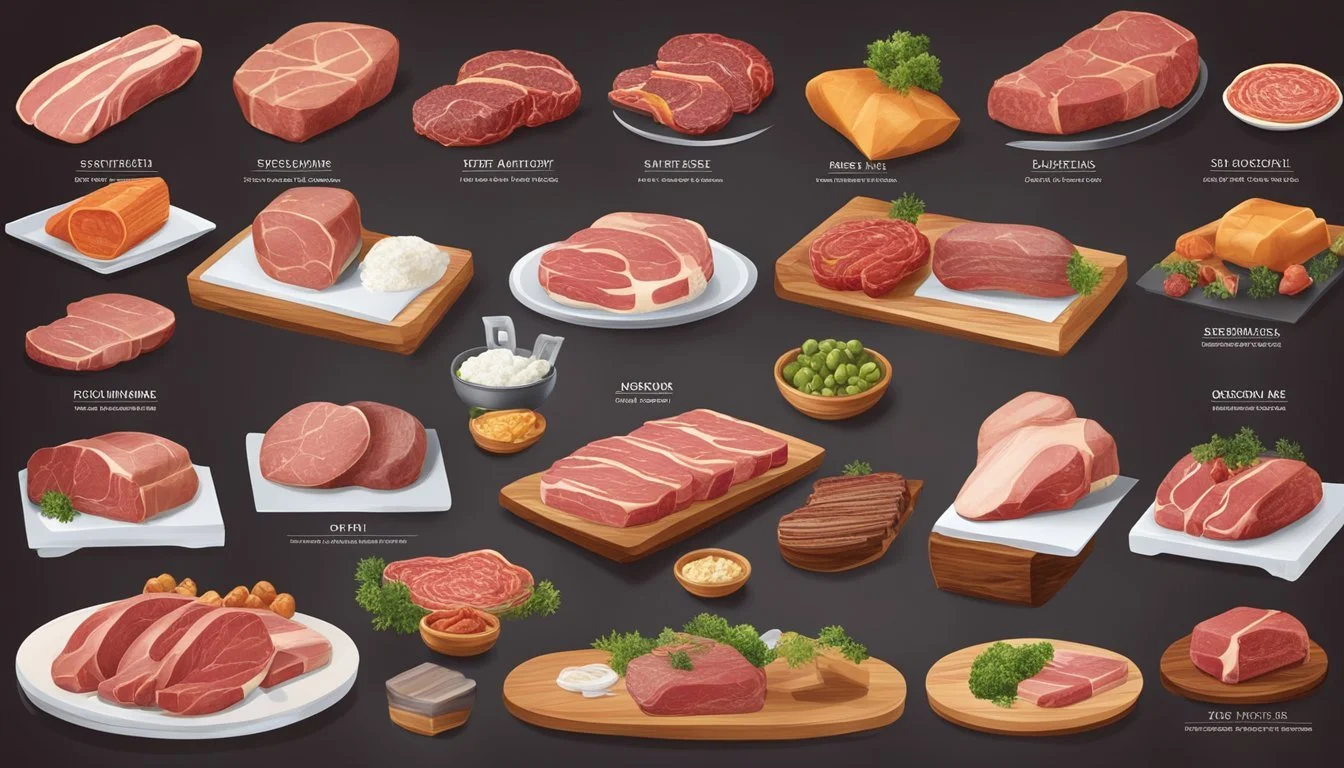Top Meat-Centric Brands for Carnivores
Ultimate Guide for Meat Lovers
For those diving into the carnivore diet, the focus is firmly on high-quality meats and animal products. This dietary lifestyle emphasizes simplicity and the consumption of nutrient-dense foods. Selecting prime cuts and top-quality meat-centric brands is crucial for reaping the nutritional benefits and ensuring satisfaction in this all-meat approach. Among the most valuable insights, choosing brands that prioritize grass-fed and wild-caught options can significantly enhance the health benefits of the carnivore diet.
Exploring the best meat-centric brands means paying attention to various factors, including the sources of the meat, the type of cuts, and any additional processing involved. Popular choices among enthusiasts include ribeye steaks, grass-fed beef, and organic poultry. These selections not only provide a rich flavor profile but also a superior nutritional profile due to their high quality and ethical sourcing.
Additionally, top brands that offer a diverse range of meats cater to the varied tastes and nutritional needs of a carnivore lifestyle. From succulent New York strips to flavorful lamb chops, these products ensure that the diet remains both enjoyable and balanced. This holistic approach guarantees a more sustainable adherence to the carnivore diet, promoting better health and enhanced vitality.
Understanding the Carnivore Diet
The carnivore diet emphasizes consuming animal-based foods, focusing on high protein and fat intake while eliminating carbohydrates. This eating plan is grounded in several core principles and offers a distinct approach compared to other low-carb diets like keto.
Origin and Principles
The carnivore diet traces its roots to ancestral eating habits, where humans relied predominantly on animal-based foods. Inspired by these early diets, the modern carnivore diet emphasizes zero-carb consumption, which mainly includes meats and animal products.
Principles of this diet are centered on high-protein and high-fat intake. By focusing on meats such as beef, pork, and poultry, individuals aim to thrive on the nutrients these foods provide. Fat becomes a primary energy source, replacing the typical carbohydrate load.
Carnivore vs. Keto Diet
While both the carnivore and keto diets are low-carb, they differ significantly in permissible foods. The carnivore diet eliminates all plant-based items, whereas the keto diet includes non-starchy vegetables and moderate protein.
The keto diet is high in fat and moderate in protein, aiming to maintain ketosis. In contrast, carnivore followers consume only animal products, allowing for higher protein intake without monitoring ketosis. This difference shapes the overall nutrient intake, with carnivore diets offering a more straightforward approach focusing solely on proteins and fats.
All-Meat vs. Animal Products Inclusion
There are variations within the carnivore diet regarding what types of animal products are included. The all-meat approach strictly limits the diet to muscle meats such as beef, lamb, and pork, ensuring maximum protein intake.
Conversely, some adherents include other animal products like eggs, dairy, and select seafood. These additions provide a broader range of nutrients, such as calcium from dairy or omega-3 fatty acids from fish. Both approaches maintain the diet’s core principle of zero-carbs, focusing on nutrient-dense, animal-based foods.
Top Meat-Centric Brands Overview
This overview provides a closer look at brands known for their quality meats, spanning beef, poultry, seafood, pork, and organ meats. It highlights the leading names in these categories, what sets them apart, and why they are preferred by carnivores.
Beef Specialists
Snake River Farms stands out for its American Wagyu beef, offering rich marbling and exceptional taste. Renowned for its high-quality standards, it brings a luxurious beef experience popular among meat enthusiasts.
US Wellness Meats provides grass-fed and grass-finished beef options, ensuring a healthier and more natural alternative. Their commitment to sustainable farming practices resonates well with health-conscious consumers seeking ethical choices.
ButcherBox delivers grass-fed beef directly to your doorstep. Known for convenience, quality, and subscription services, it caters to those wanting premium cuts without supermarket hassle.
Poultry Providers
Bell & Evans is a leading name in chicken products with a focus on all-natural and antibiotic-free offerings. Their air-chilled method enhances flavor and texture, setting them apart from conventional brands.
Mary’s Free-Range Chickens offers products raised without hormones or antibiotics. Their chickens are free-range, providing a better quality of life which translates into superior flavor and quality.
Perdue Farms delivers a mix of organic and standard chicken options. Well-known and widely available, Perdue emphasizes careful breeding and feeding practices for consistency in taste and texture.
Seafood Selections
Vital Choice offers wild-caught seafood, ensuring high standards in freshness and sustainability. Specializing in Alaskan salmon, they provide a trusted source of omega-3 rich fish.
Wild Planet Foods focuses on sustainably caught tuna and other seafood. Known for lower mercury levels and environmentally-friendly practices, their products are ideal for health-conscious consumers seeking quality seafood.
Maine Lobster Now specializes in fresh, sustainably-sourced lobster and other seafood. Direct from Maine, they guarantee a taste experience that is both authentic and high-end, appealing to seafood aficionados.
Bacon and Pork Purveyors
Niman Ranch offers humanely-raised pork with no antibiotics or added hormones. Their bacon is known for rich flavor and ethical farming practices, catering to those who prioritize both taste and sustainability.
Applegate Farms provides nitrate-free bacon options, focusing on organic and natural products. Their commitment to clean ingredients and high-quality pork makes them a leading choice for discerning consumers.
Oscar Mayer offers a wide range of pork products, including various bacon options. Widely known and accessible, their offerings are consistent in quality and flavor, suitable for everyday use.
Organ Meat Outlets
White Oak Pastures supplies a variety of organ meats, promoting nose-to-tail consumption. Their products are grass-fed and pasture-raised, appealing to those seeking nutrient-dense options.
The Butcher Shoppe provides a selection of organ meats, including liver, heart, and kidneys. Focused on quality and freshness, their offerings are ideal for consumers looking to incorporate offal into their diet.
Ancestral Supplements offers organ meat supplements like liver capsules. These products provide the benefits of organ meats in a convenient form, perfect for those who prefer not to cook or handle offal directly.
Nutritional Benefits and Considerations
Understanding the nutritional benefits and considerations of a meat-centric diet is crucial for making informed dietary choices. This section addresses key nutrients, compares with plant-based diets, evaluates health impacts, and discusses potential risks and mitigations.
Macro and Micro Nutrients
A carnivore diet supplies essential macro and micro nutrients predominantly through animal products.
Protein is a primary macronutrient provided by meats, empowering muscle growth and repair. Animal products such as beef, pork, and poultry are rich in iron, particularly heme iron, which the body absorbs more efficiently than plant-based iron.
Animal-based foods are excellent sources of vitamins such as B12, essential for nerve function and the production of red blood cells. Meats also provide minerals like zinc and selenium.
Fatty fish, liver, and egg yolks are high in omega-3 fatty acids, promoting heart health and cognitive function.
Comparison with Plant-Based Diets
When comparing meat-centric diets to plant-based diets, several notable distinctions arise.
Meat-centric diets offer ample complete proteins, containing all nine essential amino acids, which are not always present in plant sources. In terms of iron, heme iron from meats is more bioavailable than non-heme iron from plants.
Animal products deliver vitamins such as B12 and minerals like zinc without requiring supplementation. However, plant-based diets are generally higher in fiber and phytochemicals which help digestive health.
Fats from animal sources are higher in saturated fat and cholesterol, while plant-based diets primarily include unsaturated fats.
Impact on Overall Health
The health impacts of a carnivore diet vary.
The high protein intake aids in muscle maintenance and strength, crucial for active individuals and those seeking muscle mass. Omega-3 rich foods like fatty fish support heart health. Nutrient-dense organ meats provide a wealth of vitamins and minerals.
However, increased saturated fat and cholesterol consumption may elevate the risk of heart disease for some individuals. Additionally, the absence of fiber can impact digestive health, increasing the likelihood of constipation.
Monitoring blood lipid levels and maintaining balanced portions of lean and fatty cuts can help manage these concerns.
Potential Risks and How to Mitigate Them
A carnivore diet is not without risks, but they can be managed effectively.
The lack of fiber can pose digestive challenges. Supplementation or including occasional, low-carb vegetables can alleviate this. High saturated fat intake is another concern. Choosing leaner cuts and incorporating omega-3 rich fish can mitigate heart-related risks.
Essential nutrients like vitamin C are sparse in a meat-only diet, hence, careful planning and potential supplementation are necessary. Regular health check-ups can help monitor and maintain nutrient levels.
Individuals should consult with healthcare professionals before adopting a strict carnivore diet to ensure it meets their specific health needs and goals.
Online stores offer unbeatable prices for fiber supplement and vitamin C, so don't miss out!
Incorporating Carnivore Diet into Lifestyle
Incorporating a carnivore diet into daily life involves thoughtful planning and support systems. While challenging, it can enhance energy levels and provide nutrient-dense meals.
Daily Meal Planning
Creating a meal plan is crucial. Starting with breakfast, options include bacon, eggs, and sausage. For lunch, grilled chicken or turkey paired with beef jerky makes a convenient choice. Dinner could feature steak, pork chops, or lamb.
Snacks like cheese or hard-boiled eggs fit well. Rotating different meats ensures variety, helping to meet dietary needs. Maintaining simplicity supports adherence and allows focus on enjoying nutrient-dense foods.
Sustainability and Long-Term Adherence
Adapting to an all-meat diet demands consideration of sustainability. Initially, following a keto diet may aid the transition. Gradually introducing different meats acclimates digestion.
Creating a routine helps to manage costs and meal prep efficiently. Finding local sources for high-quality meats adds to the long-term feasibility. Addressing mental and social aspects aids adherence over time.
Community and Support
Engaging with a community of carnivore diet enthusiasts offers invaluable support. Online forums and social media can provide recipes, tips, and encouragement. Connecting with others who share similar dietary goals helps navigate challenges.
Participating in local Meetup groups or diets-specific events fosters a supportive environment. Hearing others’ success stories can motivate and inspire. Access to varied perspectives enhances personal commitment.
Adapting to an All-Meat Menu
Shifting to an all-meat diet necessitates adaptation. Starting slowly, integrating more meats over days or weeks, reduces the potential for digestive issues. Grilling, baking, and slow cooking different cuts add variety to meals.
Integrating organ meats like liver enhances nutrient density. Keeping track of energy levels can guide adjustments to food intake. Maintaining an open mindset and flexibility ensures lasting adherence and enjoyment.
Beyond Nutrition: Additional Health Considerations
When following a carnivore diet, individuals are not only focusing on nutrition but also various health considerations. These include weight management, blood sugar regulation, inflammation reduction, and managing autoimmune conditions.
Weight Management and Fat Loss
The carnivore diet can aid in weight management and fat loss by focusing on high-protein and high-fat intake, which can promote satiety and reduce overall calorie consumption. Protein-rich foods like beef, poultry, and pork are staples, helping to build and maintain muscle mass, which is crucial for a healthy metabolism.
Ketosis is another factor. By eliminating carbs, the body shifts to burning fat for fuel, a state known as ketosis. This process can help in reducing body fat more efficiently than some other diets.
Blood Sugar and Diabetes
A meat-centric diet might be beneficial for blood sugar control and diabetes management. By cutting out carbohydrates, individuals can reduce blood sugar spikes and improve insulin sensitivity. This dietary approach might be especially useful for those with type 2 diabetes.
It is important, however, to monitor blood sugar levels regularly and consult with a healthcare provider. While many experience positive changes, individual responses can vary. Focus on fatty fish, eggs, and organ meats for a balanced intake of nutrients that support metabolic health.
Inflammation and Autoimmune Conditions
The carnivore diet may help reduce inflammation and alleviate symptoms of autoimmune conditions. By eliminating potential dietary triggers found in plant foods like grains and legumes, some individuals find relief from chronic inflammation and related discomforts.
Gut health can also improve as the diet promotes a healthier balance of gut bacteria. Consuming meats and avoiding inflammatory plant compounds may lead to fewer gastrointestinal issues. However, it is important to choose high-quality, grass-fed animal products to ensure a nutrient-dense and anti-inflammatory diet.
Meat-centric diets demand careful consideration of individual health needs and potential reactions. Regular monitoring and adjustments can help optimize benefits and avoid potential risks.
Challenges and Misconceptions
Individuals adhering to a carnivore diet often face a range of challenges. These challenges include dealing with digestive issues, navigating social situations, and addressing common criticisms about the diet's impact on health and nutrition.
Overcoming Digestive Issues
Digestive issues can be a significant hurdle for those new to the carnivore diet. The lack of fiber, an ingredient commonly associated with digestive health, causes concerns for many.
However, many carnivore dieters find that their bodies adjust over time, reducing or eliminating initial discomfort.
Managing sodium intake is also important. While meat-based diets can be high in sodium, ensuring proper hydration and occasionally using supplements can help maintain electrolyte balance, thus avoiding potential dehydration.
Dealing with Social Situations
Adhering to a strict carnivore diet can be challenging in social settings. Whether at gatherings or restaurants, finding options that align with the diet can be difficult.
One strategy is to inform hosts or servers about dietary restrictions in advance. Bringing personal meal options to events can also be helpful.
For restaurant outings, many menus offer modifications, such as ordering plain grilled meats or avoiding dishes with additives and preservatives to stay within the dietary guidelines of a carnivore plan.
Addressing Common Criticisms
Common criticisms of the carnivore diet focus on potential health risks, particularly concerning heart disease and nutrient deficiencies.
Critics argue that high intake of red meat can increase the risk of heart disease due to saturated fats and cholesterol. However, proponents suggest that a well-structured carnivore diet, paired with adequate monitoring, may mitigate these risks.
Addressing concerns about nutrient deficiencies, especially vitamins and minerals commonly obtained from plants, can be done by including a variety of animal products like organ meats, which are nutrient-dense, and considering supplements when necessary.
Product Selection and Quality
Selecting high-quality meat products is crucial for those following the carnivore diet. By focusing on label reading skills, sourcing and ethical considerations, and ensuring variety, individuals can make informed decisions that align with their dietary goals.
Label Reading Skills
Understanding labels is paramount for choosing nutrient-rich and preservative-free products. Key aspects to look for include:
Ingredients: Ideally, the product should have minimal additives and no artificial preservatives.
Nutritional Information: Opt for meats with high protein and fat content, essential for a carnivore diet.
Certifications: Look for labels indicating grass-fed, free-range, or organic options, which often guarantee better quality and nutrition.
Paying attention to details on labels helps avoid unwanted additives and ensures that the chosen meats contribute positively to health goals.
Sourcing and Ethical Considerations
Ethical sourcing plays a significant role in product quality. Choosing grass-fed and free-range meats ensures better animal welfare and often better nutritional profiles.
Grass-fed: These meats are typically richer in omega-3 fatty acids and CLA (conjugated linoleic acid).
Free-range: Products labeled free-range indicate that animals had access to open spaces, reflecting healthier living conditions.
Organic: Organic meats are free from synthetic hormones and antibiotics, offering a cleaner consumption experience.
Ethically sourced products not only support humane practices but also tend to be higher in essential nutrients, benefiting overall health.
The Importance of Variety
Incorporating a variety of meats is essential for a balanced carnivore diet. Each type of meat offers unique nutrients:
Beef: Rich in iron, zinc, and vitamin B12.
Poultry: Leaner options like chicken and turkey provide high protein with lower fat content.
Pork: Offers a good balance of protein and fat, and is a source of thiamine and niacin.
Fish: Fatty fish such as salmon provide omega-3 fatty acids, crucial for heart health.
Diversity ensures that followers of the carnivore diet receive a comprehensive range of nutrients, preventing deficiencies and promoting overall well-being.
Culinary Inspirations and Recipes
Embracing a meat-centric lifestyle offers countless opportunities for culinary creativity, nutritious meals, and the joy of discovering new flavors.
Home Cooking Tips
Home cooking allows for complete control over ingredients and preparation. For instance, roasting meats with thyme, rosemary, and oregano enhances flavor without overpowering the dish. Baking chicken at 400°F with these herbs is a simple yet delicious method.
Sous vide cooking ensures perfect doneness, especially for steaks. Setting the sous vide to 130ºF achieves a succulent medium-rare steak. Vacuum-seal the meat, cook it in a water bath, then sear it briefly.
Using bacon or butter not only adds richness but also ensures the meat stays moist during cooking. Chopped bacon can be a tasty garnish, adding texture and depth.
Finding Carnivore-Friendly Restaurants
When dining out, look for restaurants that specialize in grilled, roasted, or barbecued meats. Many steakhouses and barbecue joints offer meat-centric menus that align with carnivore diets. High-end steakhouses often feature a variety of cuts, from ribeye to filet mignon.
Ethnic restaurants like Brazilian churrascarias serve a wide array of meats, often seasoned with simple herbs and spices. Additionally, some American diners offer all-meat options for a hearty breakfast or lunch.
Always check menus online beforehand and don't hesitate to ask for specific preparations or adjustments, like requesting butter instead of cooking oils to suit your dietary preference.
Diversity in the Carnivore Diet
The carnivore diet isn't limited to steaks and burgers. Organ meats such as liver and heart, offer unique flavors and are rich in nutrients. Poultry, like chicken and turkey, provides a leaner alternative while still being protein-packed.
Seafood, including salmon, shrimp, and scallops, adds variety and beneficial omega-3 fatty acids. Proper seasoning with herbs and minimal spices can elevate these dishes.
Exploring different cooking methods like grilling, braising, and slow-cooking can reveal new tastes and textures. By incorporating a diverse range of meats and preparations, the carnivore diet remains exciting and nutritionally balanced.











